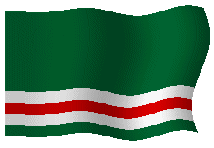В, Н, and Р (The False Friends)
These letters are all in English, the problem is that they do not look like the English equivalent. For example,
В is a
v sound,
Н is an
n sound, and
Р is an
r sound.
The only way to learn this is to just force yourself to get out of the habit of pronouncing every
P as an English
p sound.
О and Оь (The O-group)
If you are familiar with German or French, this group should be easy for you.
O is the same as in English, although similar to Russian, when unstressed, it is a short sound (like
hot). Luckily though, unlike Russian, stress always falls on the first syllable in Chechen, with the exception of Russian loan words. The
Оь is like the German
ö or French
oeu.
The sound is similar to the
ur in the word
burn П and ПI (The P-group)
П is the same as the English
p, one nice way of remembering how the letter
П sounds in Chechen and any language using the Cyrillic alphabet, is thinking of the mathematical symbol of
pi (
π).
ПI is a forced sound of
p with a small glottal stop. A fun way to try out this sound is to start bouncing your lips fast.
Whilst doing this, force out the normal
p sound and your result should be
ПI Т and ТI (The T-group)
Similar to the "P-group", the
Т and
ТI work the same way.
ТI is just a more forced
t sound with a little glottal stop.
Since a
t sound is created with your tongue rather than your lips, you should also feel a less heavy breath when saying
ТI.
У and Уь (The U-group)
Like the "O-group", these sounds are similar to German and French also.
У is like the English
oo.
Уь is like the German
ü or the French
u.
Try saying the English
u with rounded lips.
This should give you the proper sound for
Уь.
Х, Хь, and ХI (The H-group)
Another important and challenging group of letters, these consist of essential sounds in the Chechen language.
Х is said like a heavy
h but with a slight guttural sound.
In some dialects of Chechen and even Russian, the
Х is said without any gutteral sound, though in some words it is sometime hard to create a heavy
h sound without adding even the slightest of a gutteral sound.
It is the sound of Scottish
loch or German
Bach.
Хь is a heavier sound then
Х.
In Arabic, this would be the same as the letter
ح.
This sound is very important to master, because the word for
you in Chechen is "
хьо".
Can you try saying this word? The last letter in this group is
ХI, which is a very soft
h sound.
Ц, ЦI, Ч and ЧI (The C-group)
Ц is like the English
c in
cats.
Ц1 is the same thing except with a slight glottal stop.
Ч is like the English
ch in
choice.
ЧI is also the same thing with a similar glottal stop like
ЦI.
ЧIогIа и КIеда хьаьрк
In Russian loanwords, ЧIогIа хьаьрк, (
Ъ), or a hard sign, indicates that the preceding consonant is not
palatalised, whilst a КIеда хьаьрк, (
Ь), or a soft sign, indicates that the preceding consonant is palatalised.
When learning how a Chechen word is spelt, do not ignore these signs when writing or typing Chechen words.
Ю, Юь, Я and Яь (The Y-group)
Ю,
Юь,
Я and
Яь are just like their counterparts
У,
Уь,
А and
Аь except adding a
y sound before it.
1 or I (The Palochka)
You might have been wondering why the Latin letter
I is written in Chechen letter. In fact, it is actually not a Latin letter in this situation, but a letter that is totally unique in Caucasian languages. This letter is called the
palochka.
You will see it written sometimes as a
I or a
1. In Latinised Chechen, the palochka is normally written as a
w or a
', though its sound is a glottal
stop when not following a consonant letter.
Stress
Stress in Chechen always falls on the first syllable of the word.
The only exception is in foreign words and words of Russian and Arabic origin, which tend to carry over the stress rules.
Otherwise, when learning a new Chechen word, assume that the stress is on the first syllable.
Silent letters
Chechen has a lot of letters that are not pronounced and contain much liason.
If you are familiar with French, this aspect should come easy for you.
Most of the time, the last vowel at the end of a word is not pronounced.
This can become rather difficult for learners of Chechen, but after you gain a nice amount of Chechen vocabulary then learning new words will become easy for you.
Before moving on to the lessons, make sure you know the Chechen alphabet. There will not be any romanised forms of the Chechen words in these lessons, so it is important to know how the alphabet works.
Force yourself to read Cyrillic, it is all right if you read slowly at first, that is expected since this is a brand new alphabet to you. Before you realise it, you will be able to read Cyrillic as fast as you can read the Latin alphabet.
Аьтто хилла! Good luck! From WikibooksWikibooks® is a registered trademark of the Wikimedia Foundation





